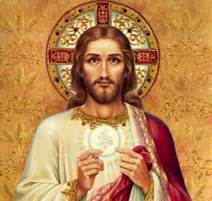
Someone defined addiction as an attempt to solve inner pain. Drinking alcohol, for example, makes a person feel better for a moment and pain seems to go away. When the effects of the drink disappear,however, a person realizes the pain is still there, and, perhaps, worse than it was before. Addiction is a false solution to a deeper problem.
We humans are constantly looking for something or someone to fill our inmost needs. Sometimes we turn to food, sometimes to recreation, sometimes work, and sometimes to another person. In time we realize all of these fall short. Is there something that can feed our deepest needs?
Jesus talks about this today (John 6:30-35). The crowd challenged Jesus:
“What can you do? Our ancestors ate manna in the desert, as it is written: ‘He gave them bread from heaven to eat.’”
They wanted Jesus to “perform” the way Moses did. In the middle of a desert Moses, so they thought, brought them the mysterious bread we call manna. What kind of food could Jesus give them?
“Jesus said to them, ‘Amen, amen, I say to you, it was not Moses who gave the bread from heaven. For the bread of God is that which comes down from heaven and gives life to the world.’”
It was not magic on Moses’ part that brought them manna. It was God handing out the bread. We remember that the people complained about the manna; they were getting tired of this “same old” food each day. Couldn’t God come up with something more tasty? The real bread in the desert was the presence of God. Each day he bestowed his love upon them—something that fed their inmost spirits, not just their bodies. This higher form of food is what kept the Israelites going. Manna took care of their bodily needs; God’s love, however, is what took care of their real needs. When people turned away from God the manna itself became boring to them.
Jesus talked to the people about a new kind of “bread” that God was giving them. Like the manna in the desert, this new bread came down from heaven. It was a direct gift of God. And unlike the manna, on the other hand, it fed not only their bodies but their inmost spirits.
Jesus whetted their appetites, and so they said:
“Sir, give us this bread always.”
They wanted Jesus to be like Moses and give them some of this new manna. Jesus replied:
“I am the bread of life; whoever comes to me will never hunger, and whoever believes in me will never thirst.”
They were looking face-to-face with the new manna. They were listening to the new manna speak to them. The presence of Jesus was giving their inmost beings a kind of satisfaction that they could find nowhere else. Even as they talked with Jesus, they were being fed without knowing it.
In time Jesus would offer himself to them in a deeper way. He would actually appear as a piece of bread, and this time it would be his own Body. This discourse of Jesus was anticipating the Eucharist in which Jesus would give himself, not merely as a teacher, but as spiritual food. When they ate this food, they would no longer hunger or thirst, because it would have the power to meet their deepest needs.
Let us not ceased to be awed by God’s bread which he gives us in such a generous measure when we participate in the Eucharist.
“…whoever comes to me will never hunger” (John 6:35)
